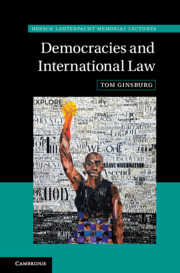Book contents
- Democracies and International Law
- Recent books in the Hersch Lauterpacht Memorial Lecture Series
- Democracies and International Law
- Copyright page
- Dedication
- Frontispiece
- Contents
- Figures
- Tables
- Preface
- Acknowledgments
- Introduction
- 1 Why Would Democracies Be Different?
- 2 Are Democracies Different?
- 3 Can International Law Save Democracy?
- 4 Regions and the Defense of Democracy
- 5 Authoritarian International Law
- 6 Whence the Liberal Order?
- Conclusion
- Index
1 - Why Would Democracies Be Different?
Published online by Cambridge University Press: 09 September 2021
- Democracies and International Law
- Recent books in the Hersch Lauterpacht Memorial Lecture Series
- Democracies and International Law
- Copyright page
- Dedication
- Frontispiece
- Contents
- Figures
- Tables
- Preface
- Acknowledgments
- Introduction
- 1 Why Would Democracies Be Different?
- 2 Are Democracies Different?
- 3 Can International Law Save Democracy?
- 4 Regions and the Defense of Democracy
- 5 Authoritarian International Law
- 6 Whence the Liberal Order?
- Conclusion
- Index
Summary
Democracies and dictatorships differ in terms of their time horizons. Governments in democracies know that the political system will continue after they leave office, whereas autocrats see the survival of the regime and of the government as being identical. This makes democrats more interested in international legal commitments, which constrain the state even after the government is gone. Further, democracies are subject to greater demands for transparency. Authoritarians, in contrast, are more risk averse. Drawing on these differences, the chapter develops a distinction between prodemocratic international law, pro-authoritarian international law, and regime-neutral international law.
- Type
- Chapter
- Information
- Democracies and International Law , pp. 31 - 59Publisher: Cambridge University PressPrint publication year: 2021

